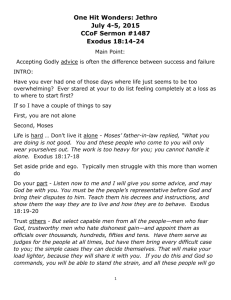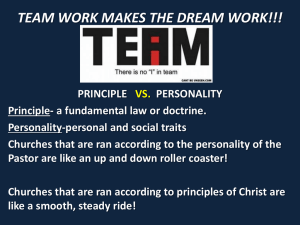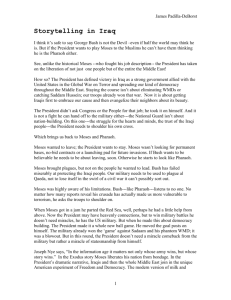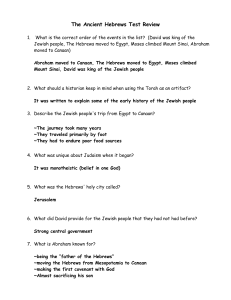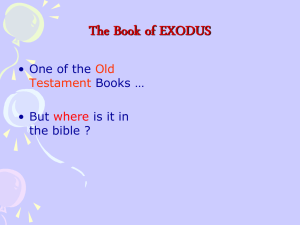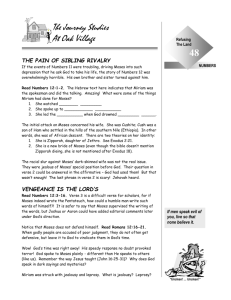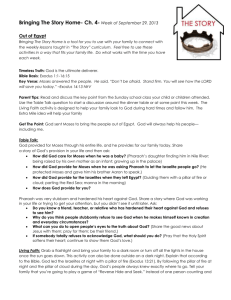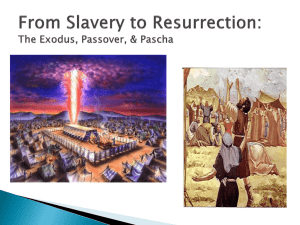Judaism – Origins 3
advertisement
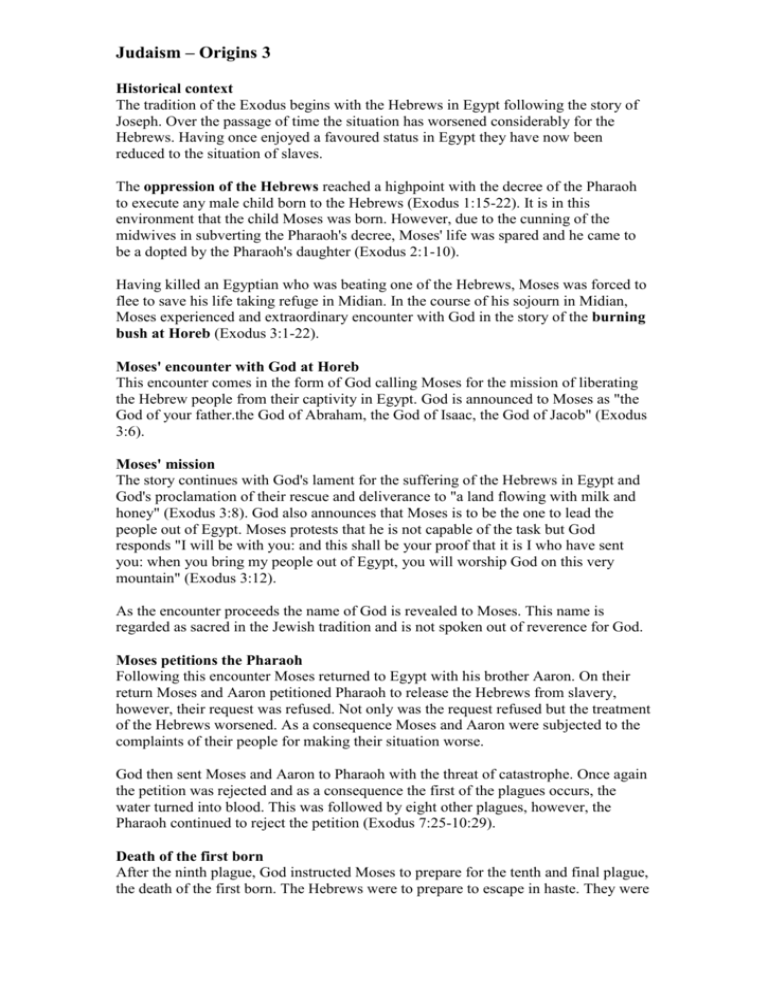
Judaism – Origins 3 Historical context The tradition of the Exodus begins with the Hebrews in Egypt following the story of Joseph. Over the passage of time the situation has worsened considerably for the Hebrews. Having once enjoyed a favoured status in Egypt they have now been reduced to the situation of slaves. The oppression of the Hebrews reached a highpoint with the decree of the Pharaoh to execute any male child born to the Hebrews (Exodus 1:15-22). It is in this environment that the child Moses was born. However, due to the cunning of the midwives in subverting the Pharaoh's decree, Moses' life was spared and he came to be a dopted by the Pharaoh's daughter (Exodus 2:1-10). Having killed an Egyptian who was beating one of the Hebrews, Moses was forced to flee to save his life taking refuge in Midian. In the course of his sojourn in Midian, Moses experienced and extraordinary encounter with God in the story of the burning bush at Horeb (Exodus 3:1-22). Moses' encounter with God at Horeb This encounter comes in the form of God calling Moses for the mission of liberating the Hebrew people from their captivity in Egypt. God is announced to Moses as "the God of your father.the God of Abraham, the God of Isaac, the God of Jacob" (Exodus 3:6). Moses' mission The story continues with God's lament for the suffering of the Hebrews in Egypt and God's proclamation of their rescue and deliverance to "a land flowing with milk and honey" (Exodus 3:8). God also announces that Moses is to be the one to lead the people out of Egypt. Moses protests that he is not capable of the task but God responds "I will be with you: and this shall be your proof that it is I who have sent you: when you bring my people out of Egypt, you will worship God on this very mountain" (Exodus 3:12). As the encounter proceeds the name of God is revealed to Moses. This name is regarded as sacred in the Jewish tradition and is not spoken out of reverence for God. Moses petitions the Pharaoh Following this encounter Moses returned to Egypt with his brother Aaron. On their return Moses and Aaron petitioned Pharaoh to release the Hebrews from slavery, however, their request was refused. Not only was the request refused but the treatment of the Hebrews worsened. As a consequence Moses and Aaron were subjected to the complaints of their people for making their situation worse. God then sent Moses and Aaron to Pharaoh with the threat of catastrophe. Once again the petition was rejected and as a consequence the first of the plagues occurs, the water turned into blood. This was followed by eight other plagues, however, the Pharaoh continued to reject the petition (Exodus 7:25-10:29). Death of the first born After the ninth plague, God instructed Moses to prepare for the tenth and final plague, the death of the first born. The Hebrews were to prepare to escape in haste. They were to sacrifice a lamb and daub blood on the door posts and lintel of the house to designate it as belonging to the Hebrews. During the night the angel of the Lord passed through the land bringing about the death of the first born in every house not marked with the blood as prescribed. The angel passed over the houses belonging to the Hebrews sparing their first born. The Passover ritual in Judaism takes its name from the "passing over" of the Hebrew households during the death of the first born. The ritual includes the elements drawn from the instructions given to the Hebrew people on the night of the Exodus from Egypt (Exodus 12). The Passover ritual is one of the most significant occasions in the Jewish calendar. Following the death of the first born, Pharaoh relented and allowed the Hebrews to go free. After the Hebrews had begun to escape, Pharaoh changed his mind and sent his army in pursuit of the fleeing Hebrews. Red Sea This pursuit climaxed at the Red Sea where Moses was instructed by God to stretch out his staff over the water which parted allowing the Hebrews to cross to the other side. In their pursuit the Egyptian army attempted to take the same course, however, Moses stretched out his hand again and the water flowed back in its place drowning the Egyptians who were pursuing them (Exodus 14:21-28). Exodus - The foundational moment in Judaism The process of the Hebrew people being liberated from their captivity in Egypt is known as the Exodus. It is a defining moment in the Jewish tradition and is seen as foundational for the tradition. In this moment of liberation the Hebrew people experience the saving action of God. They experience the reality of God's intervention in human history and they learn of God's concern for those who are oppressed. God's saving action The Exodus is a profound moment of understanding for the Jewish people. In and through the Exodus they come to understand God's intervention as a saving action overcoming oppression and leading to freedom. This liberating action is seen as characteristic of God and the concern God has for the poor and disadvantaged. Importance of liberation in Jewish ethics Not only does the Exodus stand as a foundational moment in the Jewish tradition, it also significantly defines the ethics of Judaism in rejecting oppression and working towards the liberation of all people. After crossing the Red Sea the Hebrew people were sustained in the wilderness through Quail and Manna and water which flowed from rock (Exodus 16). They continued journeying in the desert until they reached Mount Sinai. Sinai covenant Exodus chapter 19 begins the climactic experience of Moses' encounter with God at Sinai. It begins with a reiteration of the covenant made with Abraham. "If you listen to my voice and keep my covenant you shall be my special possession, dearer to me than all other people. You shall be to me a kingdom of priests, a holy nation" (Exodus 19:5-6). Ten Commandments The experience continues with the great theophany where Moses encounters God face to face on Mount Sinai. In this encounter Moses receives the Ten Commandments (Exodus 20:1-17). Torah lies at the heart of Judaism These commandments are the beginning of what is referred to as the Sinai law. This law is the Torah, the very heart of the Jewish tradition. The Torah spells out the expected response of the Jewish people to the requirements of the Covenant. 613 mitzvot The Ten Commandments are followed immediately in the text by numerous laws governing all aspects of community life. Interspersed among these laws are statements ratifying the Covenant (Exodus 24:1-11). The chapters of laws amount to 613 including the Ten Commandments. These are the 613 mitzvot of the Torah which are required to be followed by observant Jews. The 613 mitzvot of the Torah form the basis for the actions of Jewish people in relation to every aspect of life. They govern religious ritual, interpersonal relationships, business dealings, dietary requirements and a myriad of other concerns.

